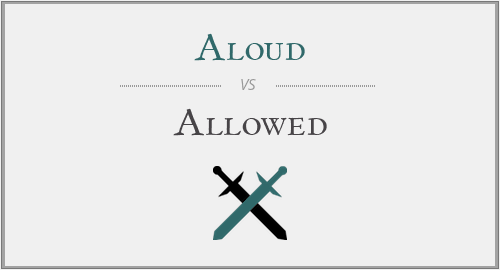This is one of the most common misspellings that appear in English grammar: “aloud” and “allowed”. These words are often confused, especially by those who aren’t sure what they mean. The main reason is, obviously, that they sound perfectly the same. Even so, they are spelled distinctly with a reason, and that’s what we’re about to discuss right now.
Read the explanations below to establish clearly and officially what “aloud” and “allowed” refer to and how to use them correctly with no confusions or doubts in your messages.
Aloud vs. Allowed
First of all, “aloud” is an adjective and “allowed” is a verb. And we’ve prepared some perfect explanations to help you remember which word refers to what concepts, according to where they have their origins. We’ll show them to you in a minute.
Anyway, “aloud” and “allowed” must never be confused, because one is used to describe something, a tone of voice or its volume, while the second is actually the past form of a verb, so used to illustrate an action that happened in the past.
When do we use “aloud”?
“Aloud” is an adverb, as already mentioned, and the best way to remember its meaning is to look at how it’s formed. If you take a closer look, you’ll notice that “aloud” is actually a derivate from “loud”, which is also used as an adverb or adjective, referring to a sharp, high-volume noise. “Aloud”, therefore, is defined as “in a way that other people can hear”. It can be a quite good synonym for “loudly”.
Example: Please read that message aloud so I can hear you. – “aloud” is a way of resuming “in a way that other people can hear you” in one word.
When do we use “allowed”?
This one might be even easier to remember, because “allowed” is actually the past tense form for the verb “allow”. The word defines the action of giving permission for something, which took place in the past.
Example: My parents allowed me to come to your party once they made sure everything would be safe here. – “allowed” is the past form of the verb “allow”, of having given permission.
Conclusion
Once you analyze for a few minutes the words from which “aloud” and “allowed” have formed, it will be extremely easy to distinguish them and use them correctly. The clues and everything you need to remember and spell them right are in the words themselves. Shortly, “aloud” is formed from “loud”, referring to the exact same thing, to a way that others can hear (loudly), while “allowed” is the past tense form for the regular verb “allow”, referring to the action of giving permission.









Have a discussion about this article with the community:
Report Comment
We're doing our best to make sure our content is useful, accurate and safe.
If by any chance you spot an inappropriate comment while navigating through our website please use this form to let us know, and we'll take care of it shortly.
Attachment
You need to be logged in to favorite.
Log In